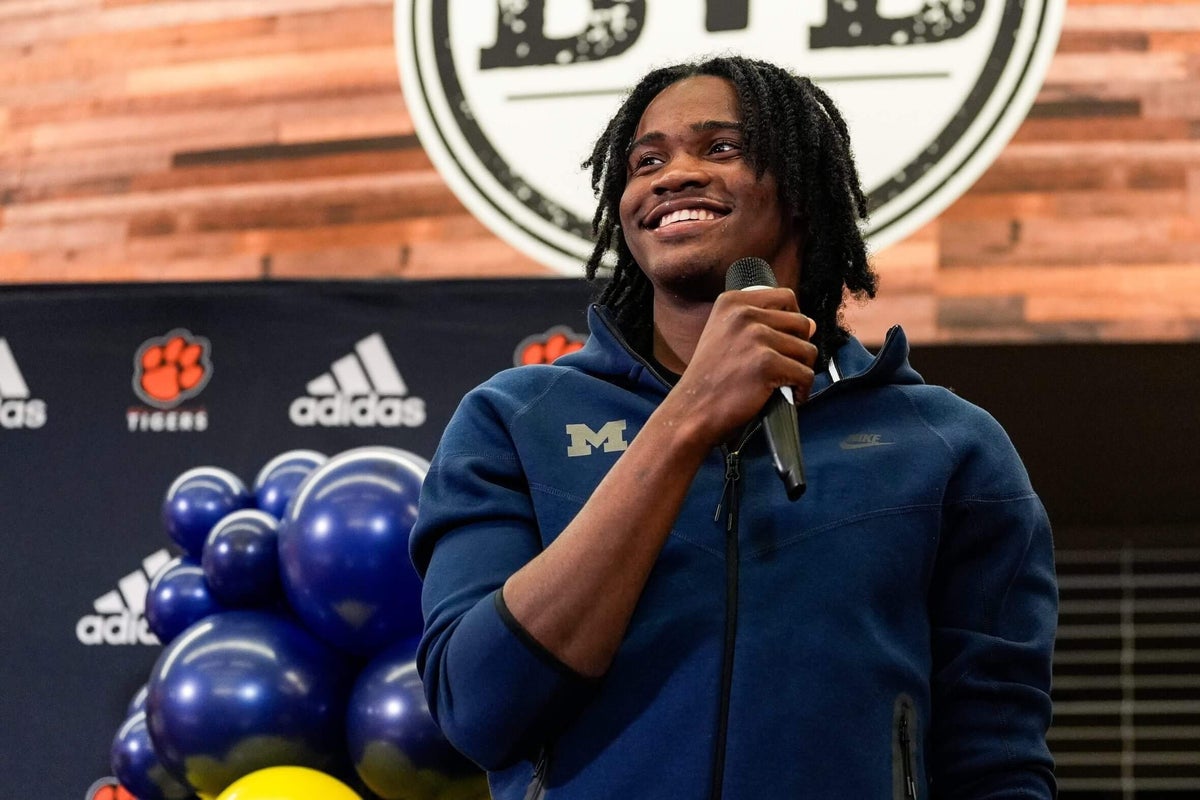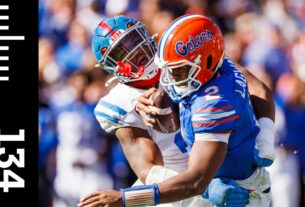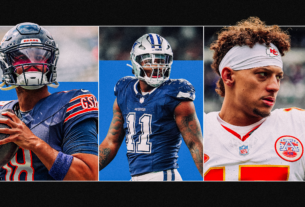BELLEVILLE, Mich. — As only a high school principal can, Nicole Crockett took the microphone and got the No. 1 football prospect in America to sit up at attention.
“Gentlemen,” Crockett said sternly, a hush falling over the room, “I need to see your eyes.”
The cafeteria at Belleville High School was packed with people attending a signing ceremony for five-star quarterback Bryce Underwood and several of his teammates. Before the players picked up their pens and posed for the first of about 10,000 pictures, Belleville coach Calvin Norman passed the microphone around the room so the players could hear from the community. When it was Crockett’s turn, she thanked the players for bringing a positive spotlight to Belleville, a school of about 1,800 students that sits between Ann Arbor and Detroit.
“It makes a difference when the kids are good,” Crockett told The Athletic. “When Bryce comes up to me and holds up his phone and says, ‘Ms. Crockett,’ it’s like, ‘What? What do you want, boy?’ And he shows me (his grades): A, A, A. What can I say? How can I not lift him up? They’re the best. You won’t find any better than them.”
Welcome home, @BryceUnderwoo16! 〽️
Signing Day Central » https://t.co/ilH2IYp4t0 #GoBlue | #ProcessOverPrize25 pic.twitter.com/omxrOfHZab
— Michigan Football (@UMichFootball) December 5, 2024
Belleville became the center of the recruiting world in recent weeks as Michigan made an all-out push to land Underwood, a pitch that included a multimillion-dollar NIL offer, video calls with Tom Brady and financial backing from billionaire Larry Ellison. When Underwood switched his commitment from LSU to Michigan last month, ESPN’s Adam Schefter broke the news to his 11.3 million followers on social media.
Tuesday night, Underwood was sitting courtside at a Detroit Pistons game, joined by Nate Forbes, a Michigan donor and the chairman of the Champions Circle collective. Wednesday, Underwood was back in the cafeteria of his high school, surrounded by people who feel fiercely protective of the 17-year-old quarterback prodigy who grew up right in front of them.
“The mama in me just wants him to be safe,” Crockett said. “I want the vultures to stay away from him.”
Is that Bryce Underwood in the building? 👀
Shoutout to @BryceUnderwoo16 for coming through to tonight’s game. @BellevilleFB @UMichFootball pic.twitter.com/IZsIZp54RS
— Detroit Pistons (@DetroitPistons) December 4, 2024
High-profile recruitments have been part of college football for years, but Underwood arrived on the scene at a particularly volatile moment. The first state laws legalizing name, image and likeness payments to college athletes took effect three and a half years ago. Final approval of the House v. NCAA settlement is expected to usher in an era of schools directly sharing revenue with athletes, starting next summer. College football is more professionalized than ever, yet many of the old taboos surrounding player compensation still exist.
Though he didn’t mention Underwood by name, LSU coach Brian Kelly — who makes more than $9 million annually after leaving Notre Dame for LSU — lamented the role of money in recruiting.
“This is a new landscape that we are in in recruiting,” Kelly told reporters at his signing day news conference. “It’s not just about finding the right fit academically. It’s not just finding the right fit where you can develop holistically and graduate and play for a championship. It’s about what’s the most money I can get, and that’s unfortunate, but it’s the world we live in.”
Two Michigan sources said Underwood stands to earn more than $10 million during his college career through multi-year NIL agreements. Underwood’s father, Jay, told the Wall Street Journal that the number could exceed $15 million. Bryce Underwood declined to discuss Michigan’s NIL pitch but acknowledged that his flip from LSU to Michigan was at least in part a business decision.
“I had to figure out what my perspective was and everything that would help my family out the most,” Underwood said.
Underwood looks and throws like an NFL quarterback at 6-foot-4 and has already drawn comparisons to players like Cam Newton and Josh Allen. The goal at Michigan is not merely to maximize his immense talent, but to maximize the potential of the Bryce Underwood brand.
Even a year ago, the idea of Michigan pulling out the financial stops to land the No. 1 recruit in the country would have seemed preposterous. Though the school gradually warmed to the new world of NIL, Michigan was wary of bidding for recruits during Jim Harbaugh’s tenure and preferred to direct NIL resources toward established players instead.
For that reason, Michigan was viewed as a longshot to land Underwood when he committed to LSU last January. Over the past six months, a plan was hatched to reset Underwood’s recruitment with the backing of some of Michigan’s biggest donors — including Michigan alum Jolin Ellison, the wife of Oracle founder Larry Ellison, whose estimated net worth of $155 billion makes him one of wealthiest people on the planet.
The aggressive pursuit of Underwood was a strategic change for a program that had a mantra of “transformational, not transactional” under Harbaugh. With a first-time head coach in Sherrone Moore, going all in with a generational quarterback recruit was a way of investing in Moore’s future.
“We realize this isn’t our way,” said a Michigan source. “No one wants to see Sherrone fail, and no one wants to see Sherrone fail because of financial issues.”
When Underwood announced his commitment to Michigan last month, Champions Circle released a statement thanking “Larry and his wife Jolin who were instrumental in making this happen.” Little is known about Jolin, who is listed in Michigan’s alumni directory under the names Jolin Ellison, Jolin Zhu and Keren Zhu. Her marriage to Ellison, 80, had not been previously reported. Representatives from the collective didn’t respond to follow-up requests for comment, and attempts to reach Jolin Ellison were unsuccessful.
Underwood’s projected NIL earnings come from a variety of sources, with marketing and merchandising playing a significant role. Underwood launched his own merchandise store in conjunction with Valiant Management Group, the marketing arm of Michigan’s collective. He also has branded apparel available through Barstool Sports, a media company catering to the sports-bro demographic. Barstool’s founder, Dave Portnoy, publicly pledged money to help Michigan land a star quarterback.
Last month, a company called Passes announced a deal with Michigan to provide a platform for Underwood and other Michigan athletes to monetize digital content. Lucy Guo, CEO of Passes, was an early employee of Snapchat and tech entrepreneur who cofounded a company called Scale AI and has net worth reported at $500 million.
Passes, which also has a deal with LSU gymnast and influencer Livvy Dunne, provides a platform for athletes to monetize livestreams, subscriptions, direct messages, video calls, meet-and-greets and even in-game experiences, Guo said.
Passes sees athletes as ideal content creators because of their popularity and massive social media reach. To get high-profile athletes signed up for its platform, Passes offers advances that come with a set of deliverables so the athletes can “meet or ideally exceed that up-front that we give them,” Guo said. Athletes do not have to pay back the advances if their earnings fall short, Guo said.
“I know a lot of people, like tech bros, that are Michigan alumni,” said Guo, who got her start in tech when she dropped out of college to accept a fellowship from Peter Thiel, the libertarian billionaire with ties to incoming vice president JD Vance. “That fandom is what we look for when we’re picking out creators. Michigan has the strongest fandom out of any other university I’ve been exposed to.”
The marriage of Silicon Valley and Michigan football represents an evolution in the program’s approach to player compensation. Harbaugh was an old-school coach who kept a tight circle inside the walls of Schembechler Hall. Perhaps by necessity, Moore, Harbaugh’s 38-year-old successor, has been more open in welcoming support from outside sources. Moore said he isn’t worried about funders having an expectation of influence.
“They know what we do, they know how we’ve done it,” Moore said. “They’re becoming a part of who we are. They understand we’ve done this for a while and know how to evaluate the players and bring the best fits here at the University of Michigan.”
Silicon Valley is a long way from Belleville, where friends and family members ate sandwiches and cake to celebrate signing day. Underwood might be a social media star in the making, but for Crockett, he’s still the teenage prankster who likes to swipe things from her desk or tap her on the shoulder and run the other way.
As a five-star recruit, Underwood became accustomed to attention during his time at Belleville. Still, Wednesday felt like crossing a threshold. Underwood was still a high school senior when he signed the piece of paper in front of him, but by the end of the month, he’ll be a Michigan quarterback with millions of people watching his journey.
“He’s as ready as anybody,” Crockett said. “He’s more ready than most people are.”
(Photo: Junfu Han / USA Today via Imagn Images)





